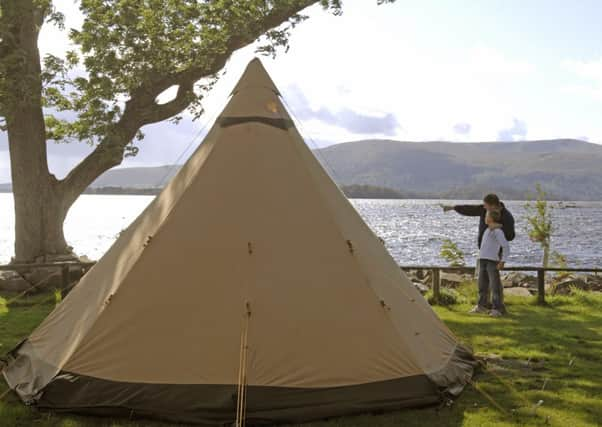Concerns over Loch Lomond camping ban plans


Ramblers Scotland and the Mountaineering Council of Scotland together called for the intervention from the Scottish Government to intervene and help resolve the dispute with the Loch Lomond and Trossachs National Park authority, which they say would “criminalise law-abiding members of the public” who pitched tents at one of Scotland’s most celebrated beauty spots.
Bylaws controlling camping on the eastern shores were introduced by the national park authority in 2011. They were aimed at reducing littering and anti-social behaviour by summertime campers, often youngsters on weekend parties.
Advertisement
Hide AdAdvertisement
Hide AdThe park hopes to extend the bylaws to the western shores -- and to introduce similar regulations at the northern end of Loch Long, as well as half a dozen other sites near Aberfoyle, Kilmahog, Strathyre, Balquhidder and Lochearnhead.
Helen Todd, Campaigns and Policy Manager with Ramblers Scotland, said today: “We have lost confidence in the National Park’s ability to resolve this dispute over camping byelaws.
“They listen to our concerns but make no effort to adjust their plans to take account of what is being said to them by outdoor organisations and experts. They are taking a much too narrow view of their responsibilities.
“By criminalising camping and other activities which are perfectly acceptable under Scotland’s right to roam legislation, the Park Authority would create immense public confusion over what is acceptable when taking access to our countryside.
“It is clear from the land reform legislation that secured our public rights of access to land and water that any byelaws introduced by national park authorities and other organisations have to be consistent with the access provisions approved by the Scottish Parliament in 2003.
“The latest proposals from the National Park fail that crucial test.”
CONNECT WITH THE SCOTSMAN
• Subscribe to our daily newsletter (requires registration) and get the latest news, sport and business headlines delivered to your inbox every morning
Advertisement
Hide AdAdvertisement
Hide AdThe call comes after Kevin Findlater MBE, a former Chief Inspector of Police in the Loch Lomond area, heavily criticised the Park Authority for its proposals, which he branded “unnecessary and draconian” in his submission to the consultation.
Ms Todd added: “This dispute is totally unnecessary. As Kevin Findlater has indicated, what we need is the proper application of the criminal law to those who are causing problems and then we can allow everyone else to enjoy the outdoors without fear of getting a criminal record.”
Andrea Partridge, Access Officer with MCofS, said the planned policy undermines the Land Reform (Scotland) Act, 2003.
She said: “It is truly disgraceful that Scotland’s first National Park, with a primary purpose to promote public enjoyment of the countryside, is now proposing to remove a right to camp for the responsible majority.
“A right that was enshrined in law is being eroded by the very organisation that should be promoting and encouraging responsible access.
“The climber who sleeps in his or her car (or bivvies beside it) in order to get an early start, the cycle tourer who needs to stop for the night or the walker who gets delayed or has simply had enough that day, all currently have the right to camp responsibly under the terms of the Land Reform (Scotland) Act 2003.
“Scotland’s first National Park will be removing these rights from everyone in order to provide a deterrent to the few who are carrying out criminal acts.
“We acknowledge there is a problem with damage and overuse at certain key locations at busy times of the year, but there has been inadequate provision of camping and associated facilities by the Park Authority to help address this problem.”
Consultations on the proposal closed on Monday night.
SCOTSMAN TABLET AND IPHONE APPS